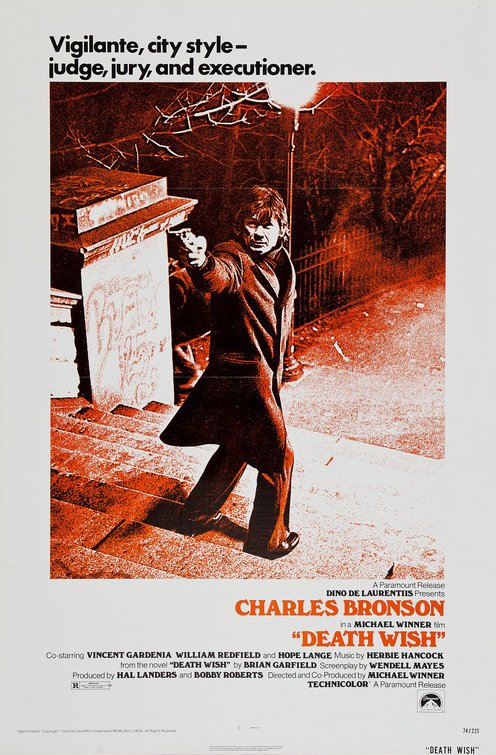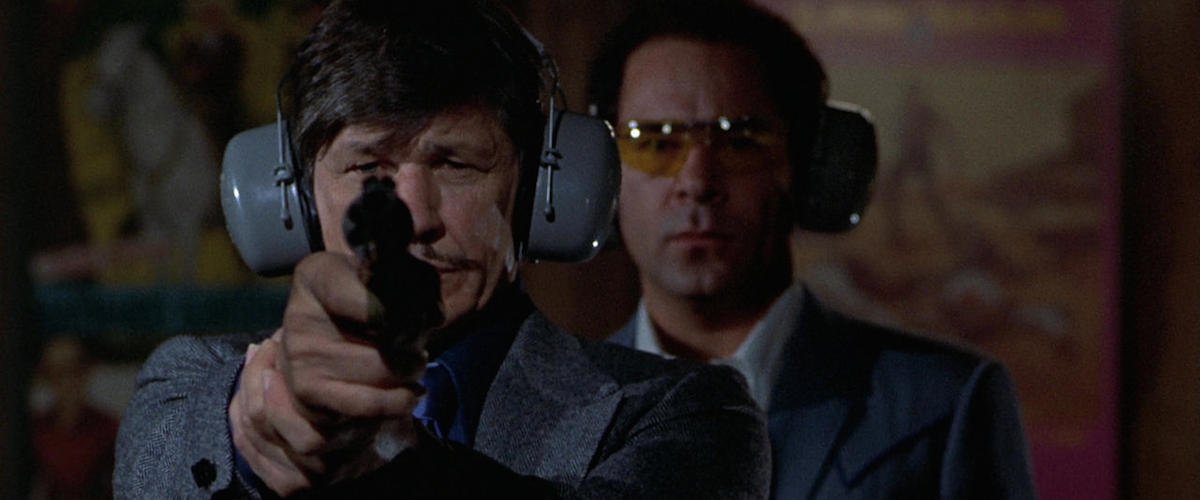DEATH WISH (1974): The Still-Underrated Champ Of The Vigilante Genre
It's easy to dismiss Death Wish as little more than a revenge fantasy. It was critically vilified from day one and its often goofy sequels pushed things into sleazy self-parody. However, if you can look at the original Death Wish with fresh eyes, you'll discover that there is much more there than it usually gets credit for. Not only is it one of Charles Bronson's best films, it is a surprisingly ambitious and challenging piece of work that hasn't lost one ounce of its power to shock.Death Wish is a (very) loose adaptation of the Brian Garfield novel of the same name. Bronson toplines as Paul Kersey, an architect and family man living in New York City. His sense of security is shattered when a group of thieves randomly target his wife (Hope Lange) and daughter (Kathleen Tolan). The wife dies from the beating she receives and the daughter is left catatonic after surviving a violent sexual assault.Kersey struggles with the helplessness and fear he feels afterwards. When a client (Stuart Margolin) from Arizona gifts him with a pistol, he begins to roam the streets to take out violent criminals. His reign of vigilante terror turns the city upside down, attracting the attention of a savvy police lieutenant (Vincent Gardenia) who is tasked with finding and stopping him. Death Wish was a smash hit in its day, trading on the audience's desire for catharsis at a turbulent time in American history. This was particularly true in New York, which was at an all-time low in terms of crime: there are legendary stories of audiences erupting into cheers when Bronson shot down muggers. Original author Garfield famously hated the film for throwing out its explicit critique of vigilantism and making a hero out of Kersey, particularly with man-of-action Bronson occupying a role that was meant for a more nebbish-y actor.But does Death Wish really deserve this sort of reception? In fairness to critics, the film does draw the viewer into the thrill of turning the tables on street crooks and the script, penned by Wendell Mayes with an uncredited assist from director Michael Winner, unambiguously stacks the deck in favor of taking justice into one's own hands. In the director's chair, Winner cannily manipulates the audience by making the assault on the women shockingly vicious and staging each standoff with street criminals as a suspenseful action setpiece.However, Death Wish also does not portray vigilantism as a cure for what ails Kersey. One of the most unique elements of the film is that Kersey doesn't track down the crooks who victimized his family. Instead, he stages a revenge scenario in the streets again and again, taking ever more suicidal risks each time. He doesn't get peace or satisfaction. Instead, he grows alienated from his last remaining family member (portrayed effectively by Steven Keats) and earns the ire of the powers that be. Without getting into spoilers, the film's haunting coda suggests there will never be peace for him.Also, Death Wish is made with great precision and style. Winner was never better as a director than he is here, using real New York locations to create the proper seedy backdrop for his tale and directing with an unerring sense of pacing. Arthur Ornitz backs up Winner's technique with sharp lensing and Herbie Hancock gives the film an edgy, nervous score that blends jazz with his skill for analog synthesizer textures.
Death Wish was a smash hit in its day, trading on the audience's desire for catharsis at a turbulent time in American history. This was particularly true in New York, which was at an all-time low in terms of crime: there are legendary stories of audiences erupting into cheers when Bronson shot down muggers. Original author Garfield famously hated the film for throwing out its explicit critique of vigilantism and making a hero out of Kersey, particularly with man-of-action Bronson occupying a role that was meant for a more nebbish-y actor.But does Death Wish really deserve this sort of reception? In fairness to critics, the film does draw the viewer into the thrill of turning the tables on street crooks and the script, penned by Wendell Mayes with an uncredited assist from director Michael Winner, unambiguously stacks the deck in favor of taking justice into one's own hands. In the director's chair, Winner cannily manipulates the audience by making the assault on the women shockingly vicious and staging each standoff with street criminals as a suspenseful action setpiece.However, Death Wish also does not portray vigilantism as a cure for what ails Kersey. One of the most unique elements of the film is that Kersey doesn't track down the crooks who victimized his family. Instead, he stages a revenge scenario in the streets again and again, taking ever more suicidal risks each time. He doesn't get peace or satisfaction. Instead, he grows alienated from his last remaining family member (portrayed effectively by Steven Keats) and earns the ire of the powers that be. Without getting into spoilers, the film's haunting coda suggests there will never be peace for him.Also, Death Wish is made with great precision and style. Winner was never better as a director than he is here, using real New York locations to create the proper seedy backdrop for his tale and directing with an unerring sense of pacing. Arthur Ornitz backs up Winner's technique with sharp lensing and Herbie Hancock gives the film an edgy, nervous score that blends jazz with his skill for analog synthesizer textures. And the acting is also fantastic. Bronson gives one of his most complex performances here. The film deals with Bronson's inherent masculinity by portraying him as a kind of sleeping giant of machismo that gets awakened by trauma. His descent into vigilante iciness is portrayed with a surprising level of emotion, an unsung element that drew audiences into the film's action.He gets excellent support from Margolin as a kind of macho shaman that awakens the beast inside Kersey and a wry, darkly funny Gardenia as the cop who understands the danger that Kersey's crusade represents to the social order. Keep an eye out for all manner of rising character actors in the smaller roles: Jeff Goldblum is terrifying as one of the men who attack Kersey's family and you'll also see people like Christopher Guest, Olympia Dukakis and Lawrence Hilton-Jacobs in early roles.In summation, Death Wish has more complexity and texture than it gets credit for. It undeniably pushes buttons and allows the audience to experience the vicarious thrill of vengeance but it quietly offsets that by showing the long-term rigors that following that path causes and how it causes one to become ostracized from society on more than one level. The careful craftsmanship deployed in the film's creation ensures that its exploration of these themes remains thrilling and shocking forty-plus years after the fact.
And the acting is also fantastic. Bronson gives one of his most complex performances here. The film deals with Bronson's inherent masculinity by portraying him as a kind of sleeping giant of machismo that gets awakened by trauma. His descent into vigilante iciness is portrayed with a surprising level of emotion, an unsung element that drew audiences into the film's action.He gets excellent support from Margolin as a kind of macho shaman that awakens the beast inside Kersey and a wry, darkly funny Gardenia as the cop who understands the danger that Kersey's crusade represents to the social order. Keep an eye out for all manner of rising character actors in the smaller roles: Jeff Goldblum is terrifying as one of the men who attack Kersey's family and you'll also see people like Christopher Guest, Olympia Dukakis and Lawrence Hilton-Jacobs in early roles.In summation, Death Wish has more complexity and texture than it gets credit for. It undeniably pushes buttons and allows the audience to experience the vicarious thrill of vengeance but it quietly offsets that by showing the long-term rigors that following that path causes and how it causes one to become ostracized from society on more than one level. The careful craftsmanship deployed in the film's creation ensures that its exploration of these themes remains thrilling and shocking forty-plus years after the fact.


